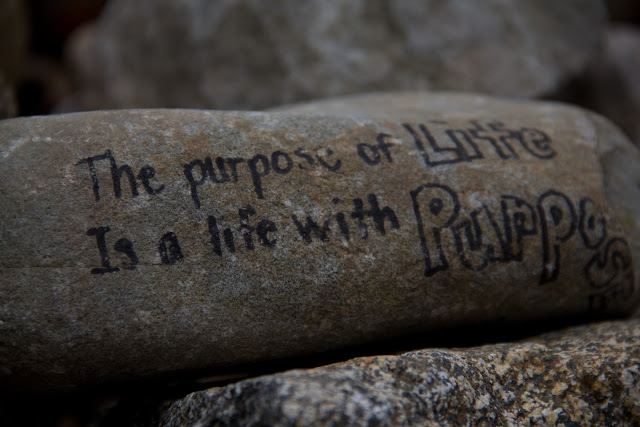I've got a story of how this past April I came to live in Waltham, Massachusetts, home of The Waltham Watch Company and the first assembly line to produce watches for the masses. Piece by piece, much like the Waltham watch, my story was built. However, this is not that story. This is the story of a time after I arrived in Waltham, the birthplace of 40 million timekeepers and a neighboring town of Walden Pond. Henry David Thoreau said this about time: It is a stream I go a-fishing in. I drink at it, but while I drink I see the sandy bottom and detect how shallow it is. Its thin current slides away, but eternity remains.
Standing on the shores of Walden Pond, I understand the magnitude of Thoreau's words. A watch keeps shallow time.
 |

I walked Walden Pond for more than an hour. Others boated, swam, and fished it, something I found strange until I learned from a teacher, there with 65 of her middle school students, that Walden Pond has always been a place of leisure for the locals. "Even when Thoreau came to the woods to live deliberately," she told the one or two of us who were listening, "people used this pond for recreation." Learning that consoled me somewhat about the amount of activity; however, I longed to have Walden to myself the way I always imagined it for Thoreau, but this is Massachusetts and solitude is relative.

After Walden, I went into Concord with plans for lunch and a trip to the Concord Museum. I'd heard that one of the lanterns which signaled Paul Revere's midnight ride to Lexington was on permanent display at the museum, and I meant to see it. However, I never made it to the museum. If you've ever been stopped by the words of Ralph Waldo Emerson, imagine coming upon the house where he wrote those words.
Standing at his gate, it slowly occurred to me that perhaps I was someplace special; someplace that didn't require museums and artifacts behind glass walls to understand its significance. But where was I beyond Concord, Massachusetts? I stood still and let things come. When I did, I felt the air vibrating around me. It was charged, and would remain so for the rest of the day. I didn't know it yet, but I stood only a half mile from Louisa May Alcott's home where she penned Little Women and fought for women's rights. Increasingly, I came to understand that Concord is a ghost town, but it is hardly abandoned.
Despite the charged air, the growing inclination that I was onto something special, and the fact that I had just visited Walden Pond, I was starving. It takes more than a hallmark of American literature for me to forget my appetite. As I looked for a place to eat, I noticed a small sign on a street corner with an arrow and the words Author's Ridge on it. The air again felt magnetic, like it was drawing me into something preordained. I didn't feel I'd lose the magnetic pull if I stopped to eat first, and like I said, I was starving. I found the Colonial Inn, an old restaurant built in 1716, and sat outside. By now, I knew the Alcott home was nearby, and I'll admit- I ordered the Alcott-wich special on the menu. I scarfed down the sandwich and quickly left for Author's Ridge. The charged air crackled around me, although there was little sound. Headstones appeared in the grass ahead. A cemetery? Soon, I stood at the main gate of the Sleepy Hollow Cemetery. A slight chill raised the hair on my arms. This was no ordinary cemetery.
I followed the signs to Author's Ridge. Gravestones for soldiers of the revolution marked the pathway in places. I walked to the back of the cemetery to a ridge, Author's Ridge, that holds the graves of Henry David Thoreau, Ralph Waldo Emerson, Louisa May Alcott, Nathaniel Hawthorne, and their families. "You're hanging with some serious ghosts," a friend wrote to me on Facebook.
Birds chirped and weed eaters sounded. The wind blew leaves across the cemetery roads. The ridge hummed with energy as I walked among the dead. Buried on this ridge are those individuals that scholars, historians, librarians, teachers, and political leaders across the country keep alive every single day. How naive of me to think they'd lie quietly just because they're dead.
"Let us know what they say," wrote my friend.
"The universe is wider than our views of it."
- Henry David Thoreau
"She had not known the weight until she felt the freedom."
- Nathaniel Hawthorne
"I like good strong words that mean something."
- Louisa May Alcott
"Finish each day and be done with it. You have done what you could."
- Ralph Waldo Emerson
Later, sitting at the doorstep of The Old Manse, a hundred or so yards from the first battle of the American Revolution, I remembered what my friend wrote. Who could know what the ghosts of Concord, Massachusetts would say? I told her I needed another afternoon with them. Probably longer. Still, I learned that the things they fought for and against in the 18th and 19th centuries remain relevant today. Maybe they'd suggest we relight the lanterns and signal another revolution. Perhaps they'd invite us to sit at their doorstep, like I was, but only for a moment, because we have an obligation to ourselves and to our country to rise and walk on our own two feet. Think with our own minds. Who can know?
Before going home, I made one final stop.

Here, Louisa May Alcott wrote, "Such hours are beautiful to live, but very hard to describe."
I hope I've done a decent enough job today describing the beautiful hours.


